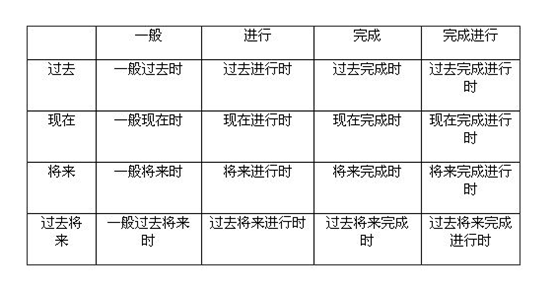(单词翻译:单击)
5天彻底搞懂语法时态第一天
现在、过去,进行
一、概念和分类
1.概念:动词时态—表达动作发生时间的状态的。
2.分类:时间和动作两个维度,相互交错产生的4✖4的16宫格。
时间分类:过去、现在、将来 + 特殊(过去将来)
动作分类:一般、进行、完成 + 特殊(完成进行)
二、时态构成:主语 + 谓语动词。
对比:Peterreads a lot.
对比:Peterwill read a lot.
对比:Peter is readinga lot.
对比:Peterhas reada lot this year.
三、三组特殊需要记忆的规则:现在,进行和过去
一般:
一般现在:
1) 主语第三人称单数,谓语动词用第三人称单数。
第三人称变化规则:
A.一般情况下,直接在动词词尾+s
get --gets
take -- takes
play --plays
B.以s, x, sh, ch, o结尾的动词,在词尾+ es
guess --guesses
fix --fixes
finish --finishes
teach -- teaches
go --goes
do-- does
C.以辅音字母+ y 结尾的动词,先把y变为i,再加es
study -- studies
try -- tries
fly -- flies
worry -- worries
carry -- carries
动词第三人称小测试:
drink ________ go _______ stay ________ make ________ look _________ have_______ pass_______ carry _______ come________ watch________ plant_______ fly ________ study_______ brush________ teach________
进行:be(am/is/are/was/were) + doing
现在分词的形成规律
A.一般在动词原形末尾加-ing
如:wash----washing catch---catching walk----walking
B.以不发音e结尾的动词,先去e,再加-ing。
如:make----making take---taking give----giving move---moving
C.以重读闭音节结尾的动词,若末尾只有一个辅音字母,应先双写字母,再加
ing
如:plan---planning sit---sitting get---getting run---running
D.以-ie结尾的动词,把变成y再加-ing
如:lie ----- lying tie ----- tying die ----- dying
小检测对应答案:
一般情况下,在动词后面直接加-ing
go - work- sing-
see- read- cook-
visit- draw- know-
以不发音的字母e结尾的动词,去掉e 再加-ing
make - write- skate-
take- dance- live-
share- give- drive-
末尾只有一个辅音字母的重读闭音节动词,先双写这一字母再加-ing
run- swim- begin-
stop- sit- get-
动词过去式和过去分词变化规则:
规则动词过去式的变化规则(过去分词变化一般同过去式,特殊动词除外)
A.一般在动词词尾加ed。
如:work—worked rain—rained watch—watched
B.如果动词以字母e结尾,变过去式时直接在词尾加d。
如:love—loved live—lived change—changed
C.如果动词是以一个元音字母加上一个辅音字母结尾的重读闭音节单词,变过
去式时,要双写这个辅音字母,再加ed。
如:stop—stopped plan—planned drop—dropped
D.如果动词是以辅音字母加y结尾,变过去式时要变y为i再加ed。
如:study—studied carry—carried try—tried
将下列句子分别改成现在和过去进行时:
1.Tom can speak Chinese.
2.We have four lessons.
3.I watch TV every day.
4.She works in a hospital.
5.His father can help them.
6.Danny, open the door.
课后练习:
1 What ______ from three to four yesterday afternoon?
A.have you done
B.had you done
C.did you do
D.were you doing
2 – I called you yesterday evening,but there was no answer.
- Oh. I'm sorry I _____ dinner at my friend's home.
A.home
B.had
C.was having
D.have had
3 My mother _____ while my father _____TV.
A.cooked;was watching
B.was cooking;was watching
C.was cooked;watched
D.cooked;watched
4 When I got home, my son _____ the music.
A.am listening to
B.listened to
C.was listening to
D.was listening
5 We heard a cry when we ______ TV last night.
A.were watching
B.would watch
C.watch
D.watched
动词第三人称小测试答案:
drinks/goes /stays /makes/looks /has/passes/carries /comes/watches/plants/flies /studies/brushes/teaches


